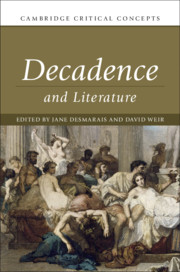Introduction
Published online by Cambridge University Press: 12 August 2019
Summary
In keeping with the nature of the Cambridge Critical Concepts series, the introduction establishes decadence as a concept. We show how the concept emerges from a combination of etymology and history, and how decadence cuts across and calls into question traditional literary categories, such as genre and periodization. We articulate the relevance of decadence to recent literary interests, such as gender politics and queer theory. Finally, we explain the rationale for the organization of the volume as an effort to ‘scale up’ and reset the parameters of decadence as a concept; preview the individual contributions to the collection; and clarify the structure of the volume: the origins of the concept of decadence, its development through nineteenth-century fields, and its application to various twentieth-century disciplines and literary modalities. The introduction concludes with commentary on the contemporary resonance of decadence today.
- Type
- Chapter
- Information
- Decadence and Literature , pp. 1 - 12Publisher: Cambridge University PressPrint publication year: 2019
References
- 1
- Cited by

